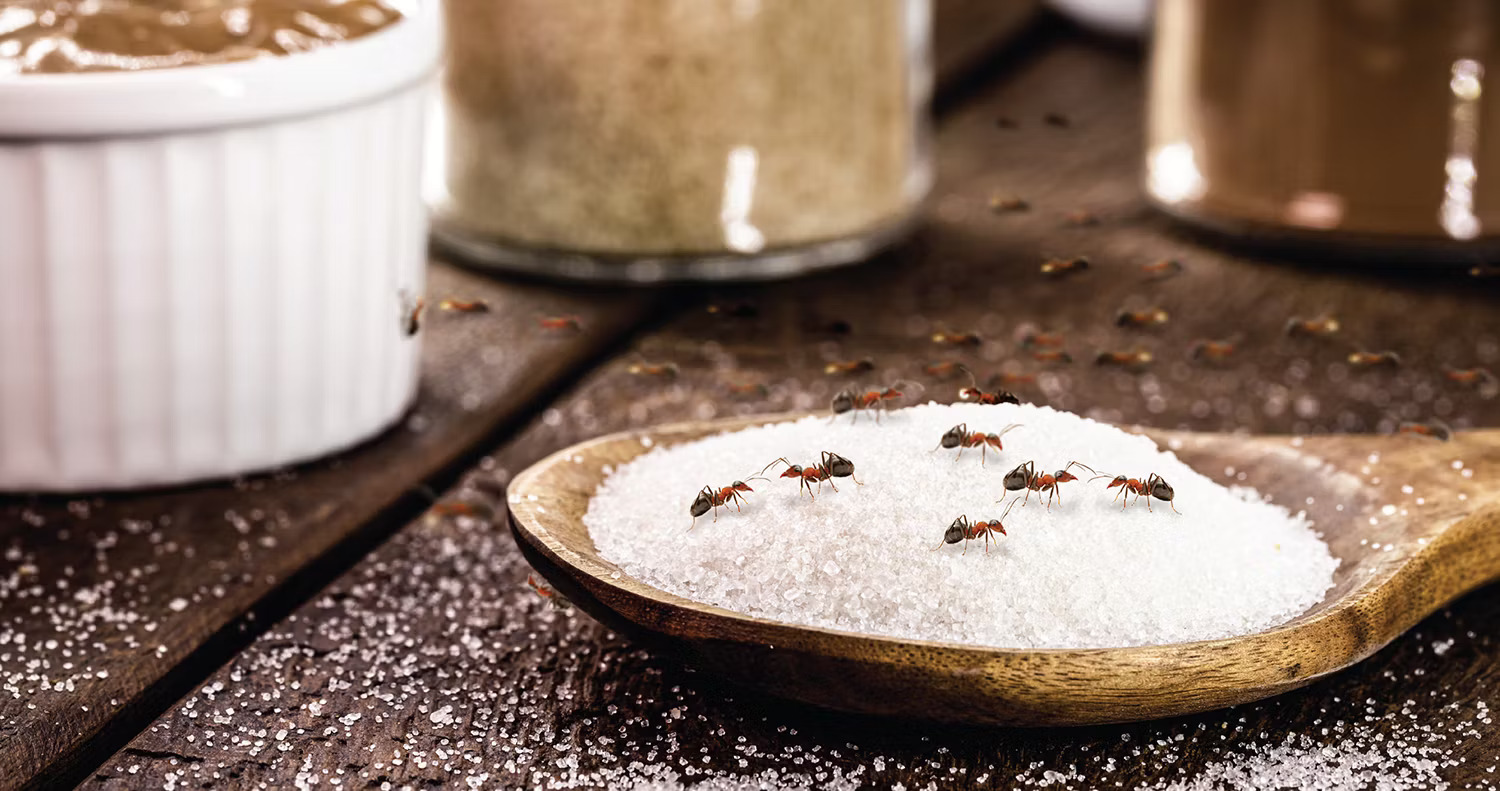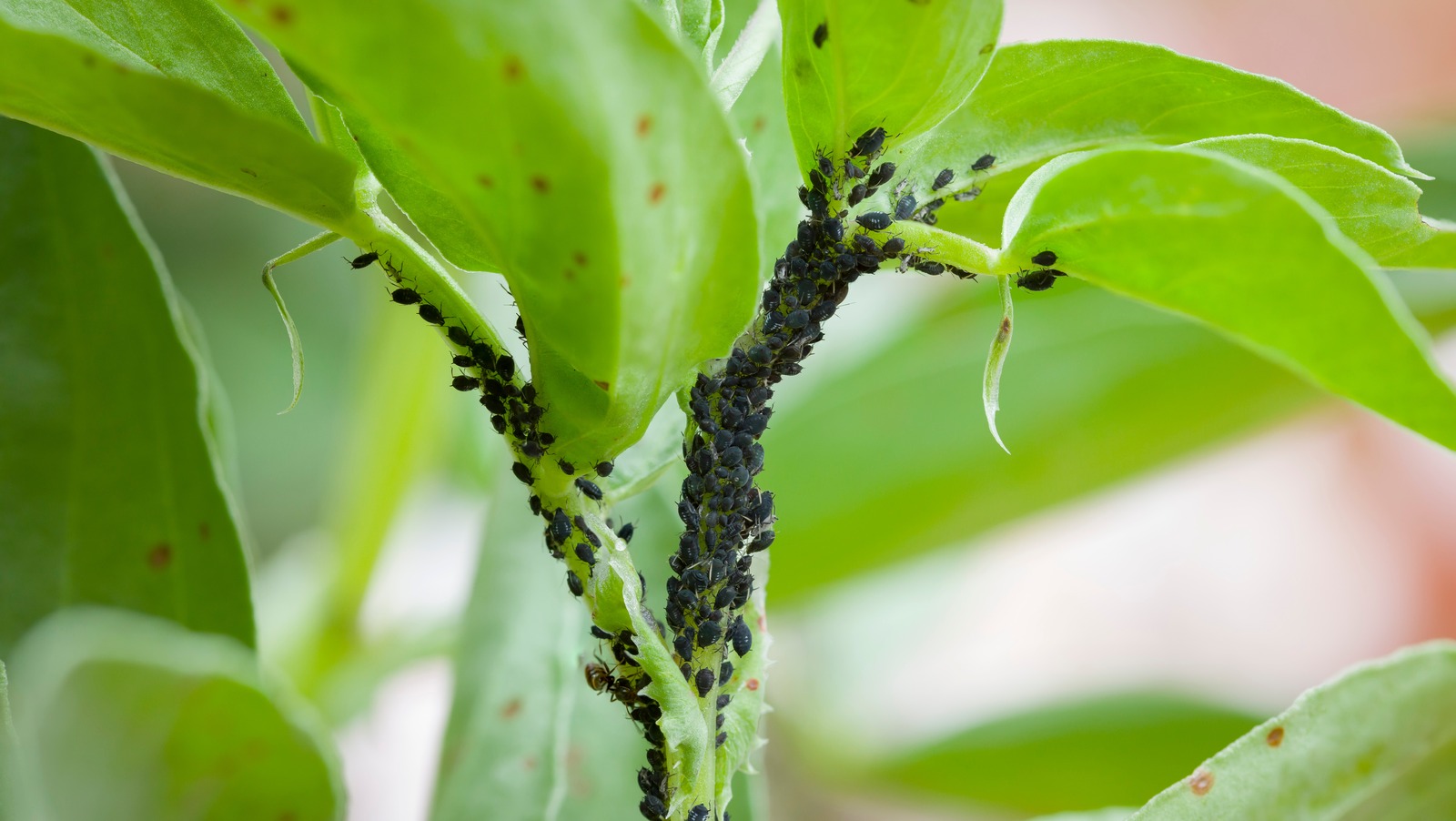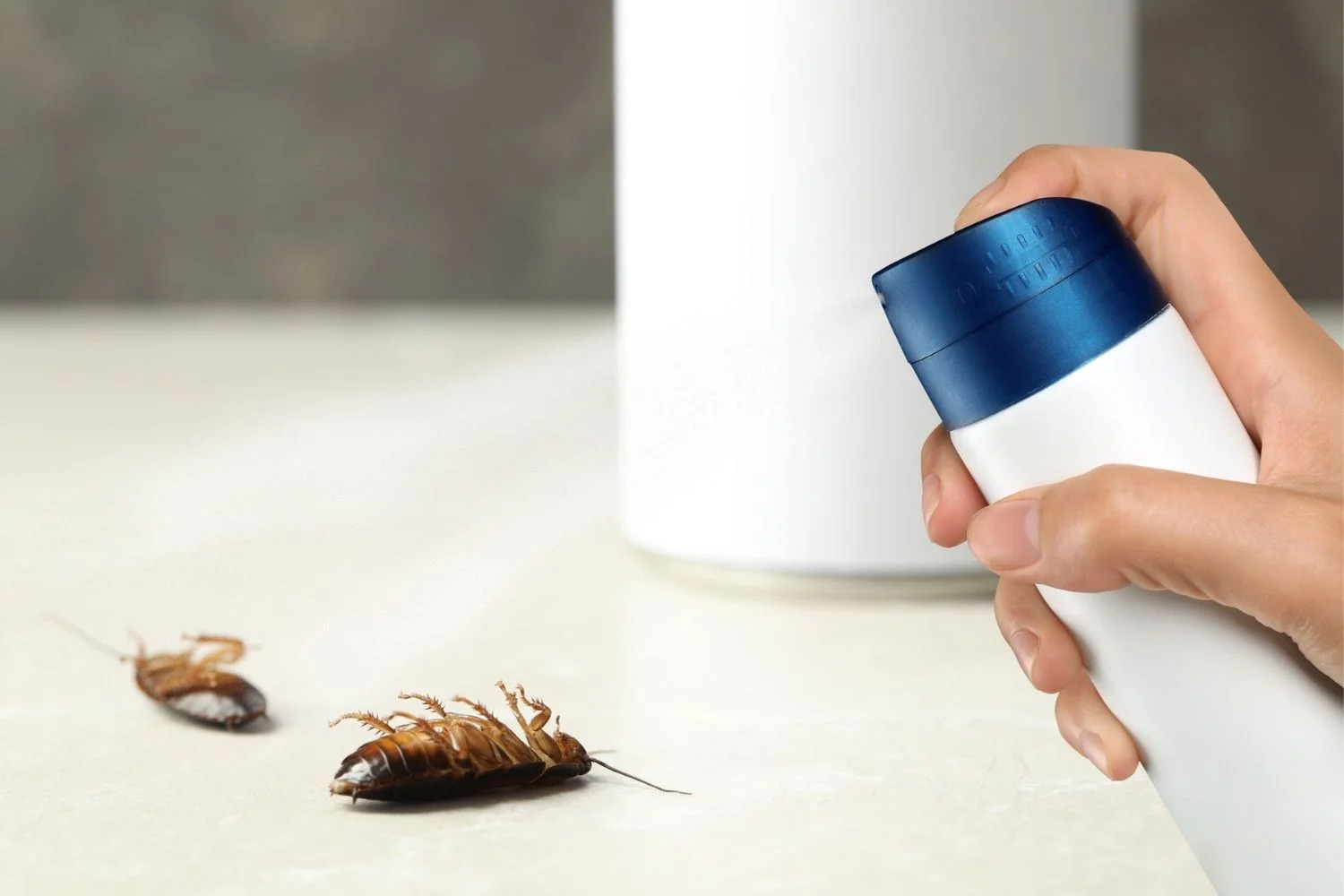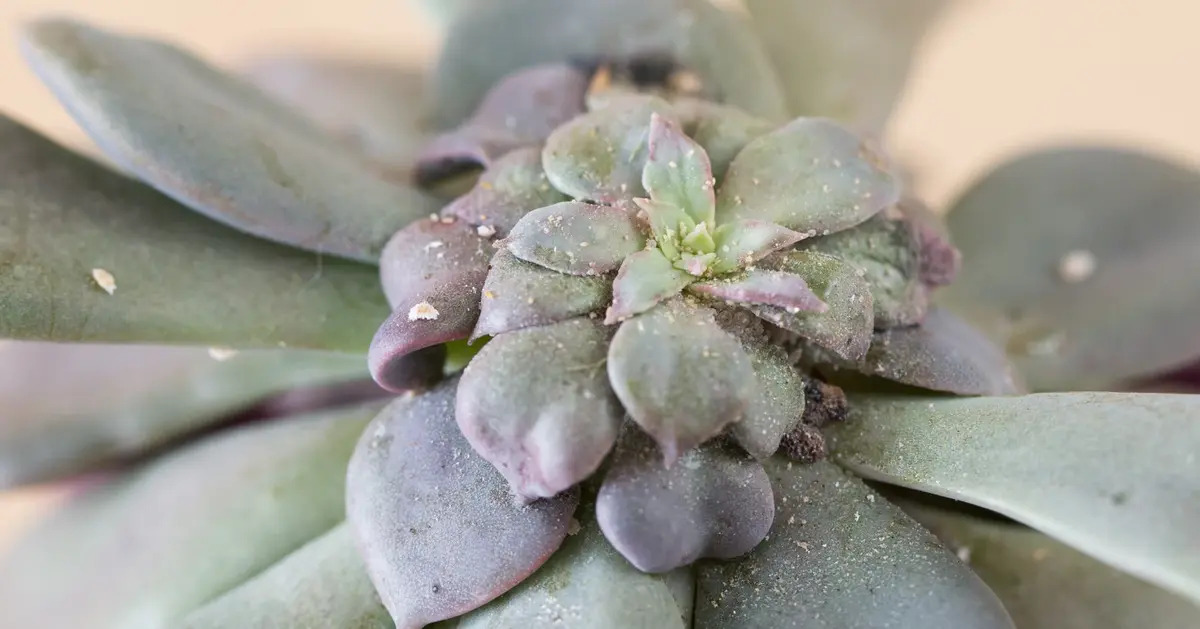Home>Gardening Tips and Tricks>Problem Solving>How To Get Rid Of Small Insects In Kitchen


Problem Solving
How To Get Rid Of Small Insects In Kitchen
Modified: January 22, 2024
Discover effective problem solving techniques to eliminate small insects in your kitchen. Get rid of pests with our expert tips and keep your kitchen clean and bug-free.
(Many of the links in this article redirect to a specific reviewed product. Your purchase of these products through affiliate links helps to generate commission for Chicagolandgardening.com, at no extra cost. Learn more)
Table of Contents
Introduction
Welcome to the world of kitchens, where delectable dishes are prepared and memories are made. However, amidst the culinary creativity, there is one unwelcome intruder that can turn even the most delightful cooking experience into a nightmare – small insects. These pesky creatures have a knack for finding their way into our kitchens, causing frustration and potentially compromising our food safety.
Whether it’s a trail of ants invading your countertops, fruit flies making themselves at home near your fresh produce, or pantry pests spoiling your dry goods, small insects in the kitchen can be a significant nuisance. The presence of these insects not only disrupts the peace and cleanliness of your cooking space but can also pose health risks.
The key to getting rid of small insects in the kitchen is understanding their habits, identifying the source of the infestation, and implementing effective solutions. In this article, we will explore common small insects found in the kitchen, discuss how to identify the source of the infestation, and provide a variety of solutions to prevent and eliminate these bothersome intruders from your cooking sanctuary.
Common Small Insects Found in the Kitchen
The kitchen is a prime breeding ground for various small insects due to the abundance of food and moisture. Understanding the different types of insects commonly found in the kitchen can help you better identify and tackle the infestation. Here are a few of the most common culprits:
- Ants: Ants are attracted to sugary substances, crumbs, and food residue. They can invade your kitchen in search of a food source and leave trails of pheromones to guide others in their colony.
- Fruit Flies: Fruit flies are small, flying insects that are drawn to ripe or decaying fruits and vegetables. They can quickly multiply and become a nuisance, especially during the summer months.
- Cockroaches: Cockroaches are nocturnal pests that are known to contaminate food and spread diseases. They are drawn to warm and humid areas and can hide in cracks, crevices, and dark corners of the kitchen.
- Pantry Pests: Pantry pests include beetles, moths, and weevils, which infest stored food products such as grains, cereals, flour, and spices. These insects lay eggs in the foods, and their larvae can cause significant damage.
- Silverfish: Silverfish are wingless insects that thrive in damp environments. They are often found in dark cabinets, behind appliances, and near plumbing fixtures. While they don’t pose a direct threat to humans, they can damage paper products and contaminate food.
It’s important to note that the presence of these small insects does not necessarily indicate poor hygiene or cleanliness in your kitchen. They can enter your home through open doors, windows, cracks, or even hitching a ride on grocery bags or produce. By understanding their behavior and habitats, you can take the necessary steps to eliminate and prevent their presence in your kitchen.
Identifying the Source of the Infestation
When dealing with small insects in the kitchen, it’s crucial to identify the source of the infestation to effectively eliminate them. Here are some steps to help you determine where the pests are coming from:
- Inspect the kitchen: Carefully examine the areas where you have noticed the most insect activity, such as countertops, cabinets, and pantry shelves. Look for signs of the insects themselves, such as trails, droppings, or eggs.
- Check for food sources: Small insects are attracted to food and moisture. Inspect your kitchen for any exposed food or spills that may be attracting pests. Look for opened packages, unsealed containers, and crumbs on counters and floors.
- Examine cracks and crevices: Insects can easily find their way into your kitchen through small cracks and gaps. Inspect walls, floors, and windowsills for any openings where pests may be entering. Seal off these entry points to prevent further infestation.
- Inspect pantry items: If you suspect pantry pests, thoroughly inspect your dry goods for signs of infestation. Look for holes in packaging, web-like substances, or larvae in your stored food items.
- Check drainage and plumbing: Some small insects, like fruit flies and cockroaches, are attracted to moisture. Inspect your kitchen sink, drains, and pipes for any leaks or standing water that may be providing a breeding ground for pests.
By identifying the source of the infestation, you can take targeted measures to eliminate the insects and prevent their return. It’s important to address both the immediate problem and implement long-term preventive strategies to ensure a pest-free kitchen.
Preventive Measures to Keep Insects at Bay
Prevention is key when it comes to keeping small insects out of your kitchen. By implementing these simple yet effective strategies, you can significantly reduce the chances of an infestation:
- Maintain cleanliness: Keep your kitchen clean and free of food debris. Wipe down surfaces regularly, sweep and mop the floors, and promptly clean up spills and crumbs. This will eliminate potential food sources that attract insects.
- Store food properly: Keep all food items, including fruits, vegetables, and dry goods, in sealed containers. This prevents small insects from accessing your food and laying eggs.
- Empty trash frequently: Dispose of kitchen waste in a sealed trash can and empty it regularly. This will minimize the chances of attracting insects, especially fruit flies and ants.
- Seal cracks and gaps: Inspect your kitchen for any gaps, cracks, or openings that pests can use to enter your home. Seal them off with caulk or utilize weatherstripping to close gaps around doors and windows.
- Keep a tidy pantry: Regularly inspect your pantry for signs of pests and rotate food items to ensure older products are used first. Clean shelves and cabinets with a mixture of vinegar and water to eliminate any potential attractants.
- Properly store trash: If you keep a compost bin in your kitchen, make sure it has a tightly sealed lid and empty it frequently. Avoid storing trash bags or bins near entrances to prevent insects from sneaking inside.
- Manage moisture: Fix any leaks or plumbing issues that create excess moisture in your kitchen. Wipe down wet surfaces, such as sinks and countertops, and ensure proper ventilation to reduce humidity.
- Inspect and clean appliances: Regularly clean your kitchen appliances, including the refrigerator and oven, as spilled food and moisture can attract pests. Pay special attention to the areas behind and underneath these appliances.
- Regular pest inspections: Consider scheduling regular pest inspections by professionals to catch any signs of infestation early and take necessary preventive measures.
By implementing these preventive measures, you can significantly reduce the risk of small insect infestations in your kitchen. Remember, maintaining a clean and well-organized cooking space is key to deterring these unwanted visitors.
Natural Remedies to Eliminate Small Insects in the Kitchen
Dealing with small insects in the kitchen doesn’t always require harsh chemical pesticides. There are several natural remedies you can try to eliminate these pests effectively. Here are some eco-friendly solutions:
- Vinegar: Fill a spray bottle with diluted vinegar (equal parts vinegar and water) and use it to clean countertops, sinks, and other surfaces. The strong smell of vinegar repels many insects.
- Citrus peels: Place citrus peels, such as orange or lemon, near areas where you’ve noticed small insects. The scent acts as a natural deterrent. Replace the peels regularly for the best results.
- Cinnamon: Sprinkle ground cinnamon near entry points or areas with high insect activity. Many insects, including ants, dislike the strong smell of cinnamon and will avoid crossing it.
- Mint leaves: Crush fresh mint leaves and place them in small sachets or scatter them around your kitchen. Mint acts as a natural repellent for ants, flies, and other insects.
- Essential oils: Mix a few drops of essential oils, such as peppermint, lavender, or eucalyptus, with water in a spray bottle. Use the mixture to spray areas prone to insect activity, like baseboards and corners.
- Diatomaceous earth: Sprinkle food-grade diatomaceous earth in areas where insects frequent, such as behind appliances or along baseboards. This natural powder is abrasive to insects and can help eliminate them.
- Boric acid: Use caution with boric acid as it is toxic if ingested. However, when used sparingly in cracks and crevices, it can effectively eliminate roaches and ants. Consult a professional or follow label instructions for proper usage.
- Traps and baits: Utilize sticky traps or homemade traps using a sweet substance, like honey or maple syrup, to attract and capture fruit flies, ants, or other small insects.
- Neem oil: Dilute neem oil with water and spray it in areas where insects gather. Neem oil has insecticidal properties and is safe for humans and pets.
- Clove oil: Mix a few drops of clove oil with water and wipe down surfaces or use it as a spray. Clove oil is effective against ants, flies, and other kitchen pests.
Remember, natural remedies may not provide immediate results and might require consistency and patience. It’s important to note that these methods are alternative options and may not work for all types of insects or infestations. If you are dealing with a persistent or severe problem, you might need to consider professional pest control services.
Chemical Solutions for Small Insect Removal
While natural remedies can be effective for eliminating small insects in the kitchen, there are cases where chemical solutions may be necessary, especially for more severe infestations. It’s essential to use these products safely and according to the manufacturer’s instructions. Here are some common chemical solutions for small insect removal:
- Insecticides: Commercial insecticides come in various forms, such as sprays, aerosols, or baits. They are formulated to target specific types of insects and can be highly effective at killing and repelling them. It’s important to choose an insecticide that is labeled for use in kitchens and follow the instructions carefully.
- Residual sprays: Residual sprays are long-lasting insecticides that leave a residue on surfaces. These can be used to treat cracks, crevices, and other hiding spots where insects may dwell. Make sure to apply them only in areas where food preparation and storage are not affected.
- Professional-grade foggers: In severe infestation cases, professional-grade foggers may be necessary. These devices release a fine mist of insecticide throughout the kitchen, reaching hidden areas where pests may be hiding. Read and follow all instructions carefully and ensure proper ventilation during and after fogging.
- Ant baits: Ant baits contain insecticides mixed with attractive food substances. The ants are lured to the bait, consume it, and carry it back to their colony, effectively eliminating the entire nest. Place the baits in areas where ants are most active and avoid using them near food preparation surfaces.
- Fruit fly traps: Fruit fly traps with a chemical lure can be effective in attracting and capturing these tiny pests. Follow the instructions on the label to set up the trap and place it near the fruit fly breeding areas.
- Roach baits and traps: Roach baits and traps can be used to target cockroach infestations. These products contain chemicals that attract roaches, and once ingested, they eliminate the pests. Place the baits in areas where roach activity is observed or suspected.
- Pantry pest traps: For pantry pests like beetles and moths, pheromone-based traps can help capture and control their population. These traps contain chemicals that mimic the pests’ natural pheromones, attracting them into the trap.
When using chemical solutions, it’s important to exercise caution and consider the potential risks. Keep children and pets away from treated areas, wear protective gloves, and ensure proper ventilation. If you have concerns or are unsure about using chemical products, it’s advisable to consult with a professional pest control expert who can provide appropriate guidance and assistance.
Professional Pest Control Options
When small insect infestations in the kitchen become overwhelming or persistent, it may be time to seek the expertise of professional pest control services. Pest control professionals have the knowledge, experience, and tools to effectively address and eliminate the infestation. Here are some professional pest control options you can consider:
- Inspection: Professional pest control technicians will conduct a thorough inspection of your kitchen to identify the type of pest, the severity of the infestation, and the entry points. This assessment will help them develop a targeted treatment plan.
- Treatment plan: Based on the inspection findings, the pest control experts will formulate a customized treatment plan to address your specific pest problem. They will use a combination of techniques and products to eliminate the pests safely and effectively.
- Extermination: Pest control professionals have access to a range of specialized treatments, including insecticides, fumigation, or heat treatments, for thorough extermination of the small insects. They will target the source of the infestation and apply treatments accordingly.
- Preventive measures: In addition to eliminating the current infestation, pest control experts can provide recommendations and implement preventive measures to ensure that the problem does not recur. This may include sealing entry points, improving sanitation practices, and implementing ongoing monitoring and maintenance.
- Follow-up inspections: Professional pest control services often include follow-up inspections to ensure that the infestation has been successfully eradicated and to address any remaining concerns. This step provides additional peace of mind and helps prevent future problems.
- Environmentally friendly treatments: Many pest control companies now offer eco-friendly or low-toxicity options. If you prefer a greener approach, discuss this with the pest control provider to explore environmentally responsible treatment alternatives.
- Regular maintenance programs: Some pest control companies offer regular maintenance programs to prevent future infestations. These programs typically involve scheduled visits and targeted treatments to keep your kitchen and home pest-free.
Professional pest control services can be particularly beneficial when dealing with severe infestations, persistent problems, or when you want to ensure the safety and effectiveness of the treatment. They have the expertise and tools to handle the situation professionally while minimizing the risks associated with chemical treatments.
Remember to research and choose a reputable pest control company that is licensed, certified, and follows industry best practices. Solicit recommendations from friends or family, read reviews, and consider obtaining multiple quotes before making your final decision.
Conclusion
Dealing with small insects in the kitchen can be frustrating and disruptive. However, by understanding the common types of insects, identifying the source of infestation, and implementing preventive measures, you can significantly reduce their presence in your cooking sanctuary.
Whether you opt for natural remedies, chemical solutions, or seek professional pest control services, the key is to address the issue promptly and effectively. Natural remedies like vinegar, citrus peels, and essential oils can help deter insects without harsh chemicals. However, for more severe infestations, chemical solutions may be necessary.
Professional pest control services offer a wide range of targeted treatments, preventive measures, and expert advice to eliminate small insects from your kitchen. They have the expertise and knowledge to handle even the most challenging infestations, providing you with peace of mind.
Remember to maintain cleanliness, store food properly, seal cracks and gaps, and manage moisture to prevent future infestations. Regular inspections and ongoing maintenance are essential in keeping your kitchen free from unwanted pests.
By implementing these strategies and staying vigilant, you can enjoy a clean, pest-free kitchen where you can cook and create without the annoyance of small insects. Don’t let these unwelcome intruders ruin your culinary adventures – take action today and reclaim your kitchen space!










